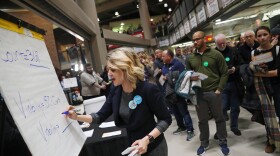The 2020 presidential primary election in Colorado is fast approaching: our state is scheduled to vote on Super Tuesday, which will be held on March 3. And, it is the first time in years that Coloradans will have a primary for this race, instead of a caucus.
Judd Choate, director of elections for the Colorado Department of State, joined KUNC’s Colorado Edition to explain what voters can expect.
Interview Highlights
These interview highlights have been lightly edited for length and clarity.
Erin O’Toole: Why did Colorado decide to switch to a primary instead of a caucus?
Judd Choate: Voters in the state of Colorado made that decision in 2016 when they voted on an initiative to roll out a presidential primary election.
Prior to that, from 2000 through the 2016 election, we were using the caucus system, which was based in state law. And then the voters decided in 2016 that they wanted a presidential primary, so that required that the legislature then effectuate a law to roll that out, so they did that in 2017, and kind of built some provisions into law that allowed for that, and this is the first time we get to use it here in 2020.
How does this process differ for voters?
So a caucus is run by the parties. They set the date and time of the caucus — it’s usually in the evening. A caucus is just a big gathering of people, and then the party for that state sets the rules for that gathering, how they will distribute votes and how people can vote in those caucuses.
A primary election is an election, just like any election, and it’s set in state law, and it’s run by our office and by the counties who administer elections.
So that means everybody who’s an active voter gets a ballot in the mail. They get that ballot in the mail three weeks prior to the election. We’re going to open vote centers eight days prior to the election. You can register to vote or update your voter registration all the way up through Election Day, just like any other election. So this primary election will seem like any other election, like a general election or the state primary did last year, in a much different fashion than a caucus does.
What do you expect the switch to the primary will mean for voter turnout?
Well, I expect that voter turnout will be very good for this presidential election, certainly related to a caucus because a caucus typically is somewhere between about 5 and 10% of the eligible voters in that caucus, or in that year for that caucus. We’ll expect for a presidential primary somewhere between 40 to 50, maybe even 55% turnout among eligible voters.
One problem with a caucus is that only those who are members of the two major parties can vote in a caucus, whereas in a primary, especially in a relatively open primary like Colorado conducts, unaffiliated voters will be able to vote.
So our 1.4 million active unaffiliated voters will also get a ballot. They’ll actually get both a Democratic and a Republican ballot, and they’ll get to choose which one of them they want to vote. And because of that, the numbers of people who participate in this presidential primary will be exponentially greater than what we would anticipate in a normal caucus year.
Why did the state make the decision to hold the presidential primary on Super Tuesday?
Under the initiative approved by voters in 2016, the presidential primary had to be in the first half of March or earlier. That was required under the initiative. So under party rules — under the Democratic party rules, and also some Republican rules — the primary could not be before March 1.
So that put the actual date of the primary in a very narrow span of dates. It could only be between March 1 and March 15. So the secretary of state and the governor worked together to agree on a particular date, as was required by the law, and they agreed on Super Tuesday, March 3.
Obviously Coloradans get to weigh in on the presidential nominee earlier this year, but what does it mean for us to be a part of Super Tuesday?
Well, it’s the first time that Colorado voters have had this big of a say in who the nominee for the two parties will be in a couple of decades.
Interestingly, if you go back to 2008, Colorado actually had a pretty big role in that election, even though our caucus fell pretty late in the cycle, and that’s because the Hillary Clinton-Barack Obama presidential primary in 2008 was so close, that even the late states had a pretty big say.
But this will be the first time in a long time where Coloradans have had an early say in who the nominees for the party will be. And I suspect that what happens in Colorado will have some effect on who the parties choose to be their nominees.
This conversation is part of KUNC’s Colorado Edition for Feb. 10. You can find the full episode here.





